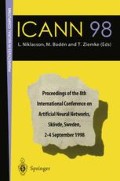Abstract
Given a set of training examples, determining the number of free parameters is a fundamental problem in neural network modeling. The number of such parameters influence the quality of the solution obtained. This paper deals with the problem of adapting the effective network complexity to the information contained in the training data set, and the task’s difficulty. The method we propose consists of choosing an oversized network architecture, training it until it is assumed to be close to a training error minimum then selecting the most important input variables and pruning irrelevant hidden neurones. This method is an extension of our previous one used for input variables selection, it is simple, cheap and effective. We show its effect experimentally through one classification and one regression problem.
Access this chapter
Tax calculation will be finalised at checkout
Purchases are for personal use only
Preview
Unable to display preview. Download preview PDF.
References
Reed R.: Pruning algorithms-A survey, IEEE Trans. Neural Networks, vol. 4, no. 5, pp. 740–747 (1993).
Yacoub M. and Bennani Y.: HVS: A Heuristic for Variable Selection in Multilayer Artificial Neural Network Classifier. In Intelligent Engineering Systems Through Artificial Neural Networks, Vol 7: C. Dagli, M. Akay, O. Ersoy, B. Fernandez and A. Smith (Editors), pp. 527–532, (1997).
Yacoub M. and Bennani Y.: A Neural Network Methodology for Machines’ Class Identification. Proc. IEEE International Joint Conference on Neural Networks (IJCNN’98), Vol. 1, pp. 322–325 (1998).
Breiman L., Freidman J., Olshen R., Stone C.: Classification and regression trees. Wadsworth Int. Group. (1984).
De Bollivier M., Gallinari P., Thiria S.: Cooperation of neural nets and task decomposition. International Joint Conference on Neural Networks (IJCNN’91), Vol. 2, pp. 573–576 (1991).
Weigend A.S., Huberman B.A. and Rumelhart D.E.: Predicting the future: a connectionist approach. Int. Journal of Neural Systems, Vol. 1, No 3, pp. 193–209 (1990).
Goutte C.: On the use of pruning prior for neural networks. In Neural Network for Signal Processing VI, pp. 52–61 (1996).
Svarer C., Hansen L.K., Larsen J.: On design and evaluation of tapped-delay neural networks architectures. In IEEE International Conference on Neural Networks, pp. 46–51 (1993).
Author information
Authors and Affiliations
Editor information
Editors and Affiliations
Rights and permissions
Copyright information
© 1998 Springer-Verlag London
About this paper
Cite this paper
Yacoub, M., Bennani, Y. (1998). Architecture Optimization in Feedforward Connectionist Models. In: Niklasson, L., Bodén, M., Ziemke, T. (eds) ICANN 98. ICANN 1998. Perspectives in Neural Computing. Springer, London. https://doi.org/10.1007/978-1-4471-1599-1_137
Download citation
DOI: https://doi.org/10.1007/978-1-4471-1599-1_137
Published:
Publisher Name: Springer, London
Print ISBN: 978-3-540-76263-8
Online ISBN: 978-1-4471-1599-1
eBook Packages: Springer Book Archive

